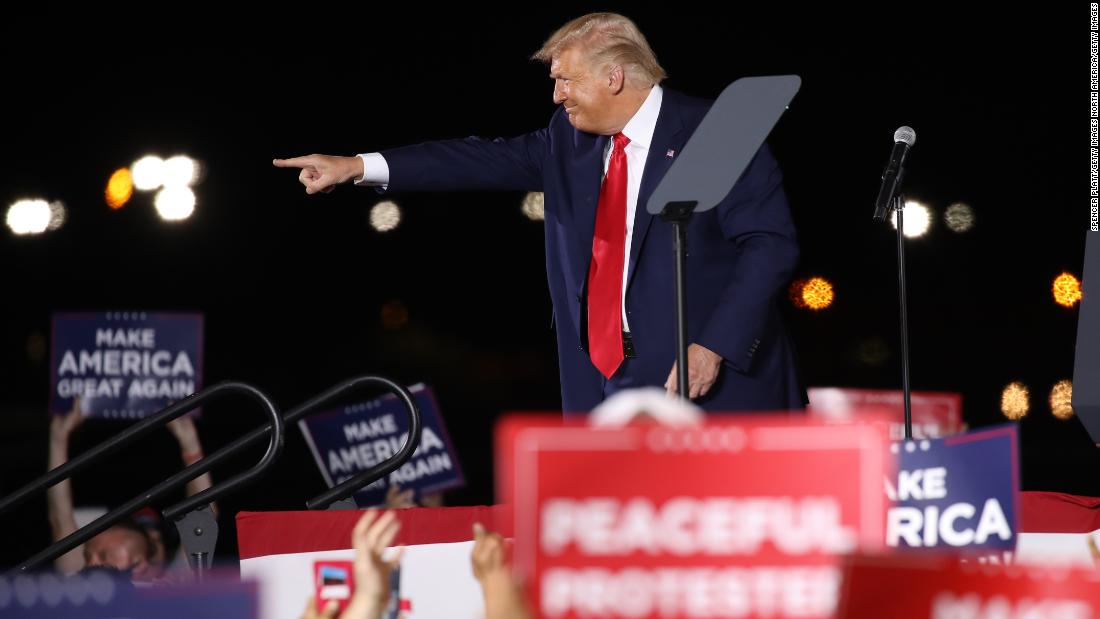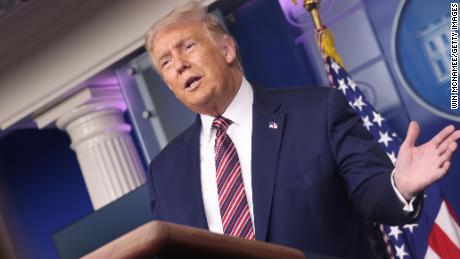Analysis: Trump administration unleashes a new effort to undermine election integrity
‘A slap in the face to the American people’
The President’s explanation for the change to election security intelligence briefings Saturday sounded benign, as usual. While visiting Texas to survey the response to Hurricane Laura, he said Director of National Intelligence John Ratcliffe had eliminated the in-person briefings because he wanted to make sure that election security information “doesn’t leak.”
Sen. Angus King, an independent from Maine, rejected that explanation as a rationale during an interview Saturday with CNN’s Wolf Blitzer on “The Situation Room.”
“The taxpayers of America are paying billions of dollars for the collection of intelligence — and we, the people, should have the benefit, the knowledge that that intelligence brings,” said King, who caucuses with the Democrats. “Learning about it next February or March doesn’t do much good. We’re talking about interference with our election this year, which we know is going on — the intelligence community has already told us that.”
King pointed out that members of Congress need the face-to-face briefings in order to ask follow-up questions to the written reports, to probe and deepen representatives’ understanding of the intelligence. “So this is a real step backward. It’s a real slap in the face to the American people, who have a right to know what the intelligence community knows. That’s what they’re there for.”
But Trump dismissed the alarm sounded by lawmakers like House Speaker Nancy Pelosi and House Intelligence Chairman Adam Schiff, two of his top political adversaries, who called the maneuver “a shocking abdication” of the administration’s “lawful responsibility” to keep Congress informed and “a betrayal of the public’s right to know” about efforts by foreign powers to interfere in their elections. The President suggested without evidence that Schiff or others might have leaked information from previous intelligence briefings.
“Director Radcliffe brought information into the committee and the information leaked,” Trump told reporters in Texas in response to a question about the reason for the change. “Whether it was shifty Schiff or someone else, they leaked the information before it gets in and what’s even worse they leaked the wrong information and he got tired of it, so he wants to do it in a different form because you have leakers on the committee.”
Schiff responded on Twitter Saturday night by saying the President was “lying and projecting.” The California Democrat argued that Trump fired the last Director of National Intelligence for briefing Congress on Russian efforts to help his campaign.
“Now he’s ending briefings altogether,” Schiff tweeted. “Trump doesn’t want the American people to know about Russia’s efforts to aid his re-election.”
King told Blitzer that during his nearly eight years on the Senate Intelligence Committee, he couldn’t recall any time when anything was leaked from the committee.
Potential foreign meddling
“We assess that China prefers that President Trump — whom Beijing sees as unpredictable — does not win reelection,” Evanina wrote. “China has been expanding its influence efforts ahead of November 2020 to shape the policy environment in the United States, pressure political figures it views as opposed to China’s interests, and deflect and counter criticism of China.”
Evanina said Russia “is using a range of measures to primarily denigrate former Vice President Biden and what it sees as an anti-Russia ‘establishment.’ This is consistent with Moscow’s public criticism of him when he was Vice President for his role in the Obama Administration’s policies on Ukraine and its support for the anti-Putin opposition inside Russia.”
Iran, Evanina said, is trying to “undermine US democratic institutions” and Trump in the hopes of further dividing the country.
In a show of bipartisanship at the time, Florida Sen. Marco Rubio and Virginia Sen. Mark Warner, the top Republican and Democrat on the Intelligence Committee, released a joint statement encouraging the intelligence community to “continue to make this information available.”
On Saturday, they responded to the news in separate statements. Warner called the decision to stop in-person briefings an “unprecedented attempt to politicize an issue — protecting our democracy from foreign intervention — that should be non-partisan.”
“Congressional oversight of intelligence activities now faces a historic crisis,” Rubio said in his own statement. The Florida Republican went on to blame Democrats and slam the leaks.
“Yet, this grotesque criminal misconduct does not release the intelligence community from fulfilling its legal requirements” of keeping Congress informed, he said, adding that he’d spoken to Ratcliffe, who said the committee will continue to receive briefings. There’s no indication that means in-person briefings will resume.
The Trump administration’s policy change on intelligence briefings could clearly limit the amount of information that American voters have about election interference — the question now is whether they will demand greater transparency from the administration about efforts to subvert their democracy.
![]()




